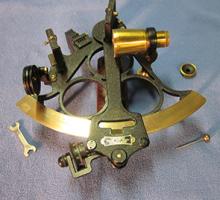 I first arrived in New York harbor forty years ago, as a freshly minted naval architect working for Moore McCormack. In those days, the Brooklyn docks were crowded with US flag shipping companies, many with their headquarters or sales offices in Lower Manhattan. Just to the north, in the narrow streets of Tribecca and Soho were clusters of little workshops where often elderly craftsmen repaired or calibrated chronometers and sextants, and rebuilt or reconditioned everything from pumps and valves to ship’s order telegraphs to the old tube radar sets.
I first arrived in New York harbor forty years ago, as a freshly minted naval architect working for Moore McCormack. In those days, the Brooklyn docks were crowded with US flag shipping companies, many with their headquarters or sales offices in Lower Manhattan. Just to the north, in the narrow streets of Tribecca and Soho were clusters of little workshops where often elderly craftsmen repaired or calibrated chronometers and sextants, and rebuilt or reconditioned everything from pumps and valves to ship’s order telegraphs to the old tube radar sets.
In New York, these shops are long gone now. I was please to recently learn of a shop in Medford, MA, where Ridge White, 73, proprietor of Robert E. White Instrument Services, is carrying on a three generation family tradition of maintaining and repairing nautical instruments, particularly sextants. From an interview with Cindy Atoji-Keene in Boston.com:
“My forefathers were ship builders on one side and nautical instrument makers on the other. My grandfather, Wilfrid O. White, studied with the revolutionary scientist Lord Kelvin in the UK, then came to Boston and established a store near the Boston waterfront in the early 1900s. He invented the spherical compass, still used by many sailors today. My father continued the business, and early on I was tinkering with marine sextants, aneroid barometers, and barographs.
“Very few places around the country do what I do. I am happy to not be in my right mind helping people who need some service. Just yesterday I received an old English barograph that had a total failure of the sensors, which is like having a car that needs a new engine. I’ll have to install aneroid cells or capsules then put it into my test chamber to make fine adjustments. The owner of this lovely instrument inherited it from his father and it will function like new when I’m done.
“There are few things that I can’t do, and I most enjoy servicing sextants; these precision instruments are a joy to work on. They rarely need a new part, but occasionally need careful adjustment. Sextant sales, while hardly brisk these days, seem to be steady. It’s part of a renewed interest in simplicity. Navigating across the ocean without electronics keeps our minds alive instead of being slaves to the wizardry of modern gadgetry.
“I also teach coastwise navigation, navigating using buoys and coastal aids as well as tides and currents. What happens if you don’t have a GPS or the batteries go low? It’s like learning multiplication tables while you have a calculator at your desk. It’s valuable to know what’s behind the digits on the screen.”
Thanks to Lee Gruzen for contributing to this post.

Great article, nice to hear Ridge is carrying on repairing these fine crafted instruments of a bygone era.
I believe the business to be located in Medfield, not Medford MA as the article states.
Robert E. White Instrument Services, 11 Pound Street, Medfield, MA 02052
Sincerely,
Capt. J. Vincent Collins
Master Oceans 500GT
Good one!!
Good to know. A modern Iron Law of the Sea states, “Electronics will always fail, AND at the worst possible time.”
Our friend and author of the famous law was an eternal optimist.